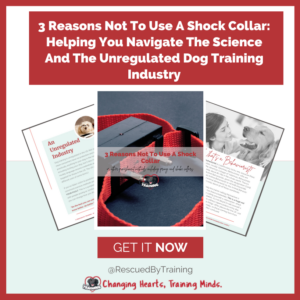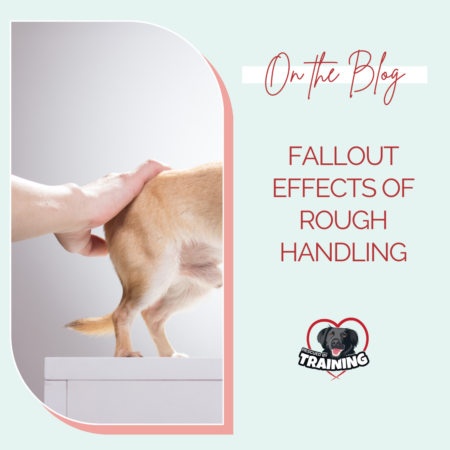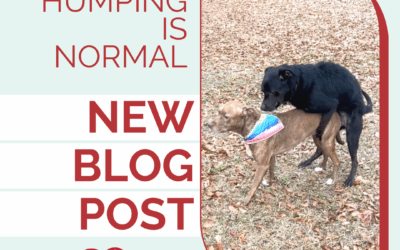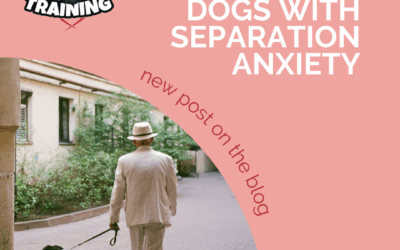 I’ve previously written about the fallout effects specifically of shock collars. But I wanted to more broadly touch on our regular interactions with our dogs, especially puppies in their critical socialization window, and why things like clamping a puppy’s mouth for puppy biting is such a bad idea.
I’ve previously written about the fallout effects specifically of shock collars. But I wanted to more broadly touch on our regular interactions with our dogs, especially puppies in their critical socialization window, and why things like clamping a puppy’s mouth for puppy biting is such a bad idea.
Recently I’ve come across other rough handling suggestions like grabbing/twisting a dog’s ears, scruffing them, muzzle clamping (even outside of puppy biting), grabbing a dog’s tail and other horrible suggestions as “training advice.” These are of course in addition to the “normal” suite of bad advice that circulates like leash corrections, verbal eh-ehs, and the like.
Not only are these unlikely to solve whatever the training problem was but it’s very likely to create some new problems like body handling issues, fear of people, fear of being leashed and more.
Just as there are fallout effects from using punitive and painful training methods like shock collars, even if it looks like it only took one of two times for it to “work,” there are fallout effects from physically manhandling your dog or using physical coercion in training.
If you clamp your dog’s mouth shut when they mouth or “tap” them on the muzzle when they bark, or use your hands in any way to stop behavior, how is your dog supposed to know the next time you reach to pet them that you are just reaching to pet them and not to “tap” their muzzle?
Using physical methods in training is one of the quickest way to teach your dog that people reaching towards them is something to avoid and they should cower or run away or that they should defend themselves against people by growling, snapping or biting, to prevent the person from touching them. Or, if kids are allowed to pull on the dog’s tail or ears and you do nothing to help protect your dog, your dog will quickly learn the way to avoid that pain is to avoid or bite kids. And he’ll likely develop a fear kids.
Are these things you really what you want to teach your dog?
If your goal is a well socialized dog, then all interactions need to be with kindness and never with punishment, coercion or manhandling. Even verbal corrections can be scary enough to a dog to cause unintended fallout effects. Remember, if punishment works, it somehow hurt or was punitive enough to the dog to stop the behavior, even if you don’t think it was scary or punishing. So even just saying “NO” in a loud voice can be scary. And that could cause your dog to become a little afraid of you, or of loud sounds.
What are the possible fallout effects from rough handling?
- body handling sensitivity
- fear of being reached towards
- fear of vetting and grooming
- fear of walks/leashes
- learned helplessness where the dog just shuts down in different situations
- suppression of warning signs and communication
- deterioration in your relationship and lack of trust in safety with you
- long lasting stress effects, creating more generalized fear or anxiety
We know there are better, more effective and more humane ways to train dogs that don’t require any scary or painful methods. Many countries in the world ban the use of shock (and in some cases, prong collars also). If you’ve used these methods in the past, fallen victim to predatory training methods or were convinced aversive methods were the solution, know that it’s NOT YOUR FAULT. Now you know better and you can change how you do things NOW.
“Do the best you can until you know better. Then when you know better, do better.” – Maya Angelou
So while some people turn to things like shock collars, thinking they will save money, we know from other research that aversive methods can (and often do) result in increased fear, aggression, or learned helplessness, and fixing those long-term issues properly will cost you more money in the long-run, not to mention the emotional cost to your dog and the damage to your relationship with him.
For more about this topic, you can read these other posts where I’ve addressed the topic of Behavior Suppression Isn’t Behavior Modification, Fear Is Not Disobedience and that dogs very rarely “bite out of nowhere.” The common thread in these posts is behavior issues getting worse with punishment based methods of training.
There are better, more humane, more effective ways to get results and I can help you. Contact me and schedule a session if you need help.
Happy training!
![]()




